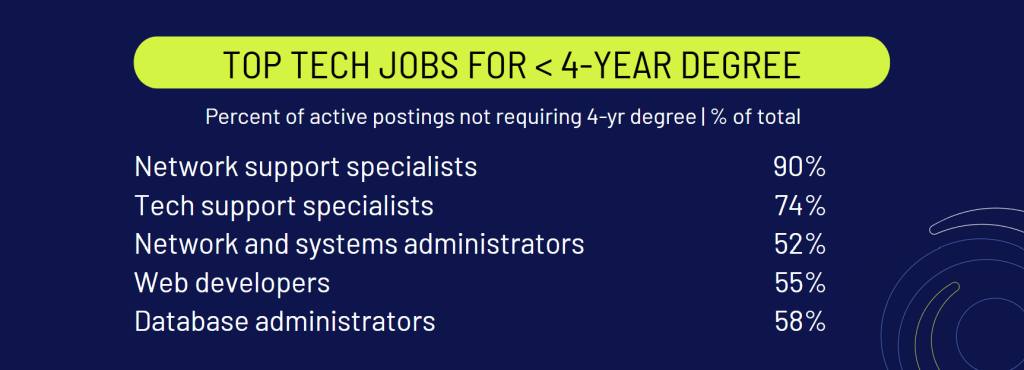At What Point Does a College Degree Become “Stale”?
Key Takeaways
- Degrees don’t technically expire, but in fast-moving fields like tech consulting careers, stale skills can limit your opportunities.
- Earning new IT certifications and updating technology skills keeps your degree marketable when changing roles or re-entering the workforce.
- Even long career gaps can be bridged with practical steps and up-to-date skills.
A college degree opens doors — but in tech consulting, keeping your skills fresh can be more important. So how do you know when your degree isn’t enough anymore, and what should you do about it?
This guide explains how to spot when your degree is going stale, and how to refresh it with smart, practical moves.
How Long Does a Degree Stay Relevant After Graduation?
A new degree is a strong advantage — but it doesn’t stay fresh forever. In tech consulting careers, employers expect you to use your knowledge and to keep your skills current.
If your job search drags on, your degree’s impact can fade. Here’s how to keep your degree fresh and your resume strong.
To stay competitive:
- Volunteer for tech-related projects. Nonprofits and startups often welcome help with IT tasks or basic consulting work.
- Accept an internship if needed. Any hands-on experience shows employers you’re serious about applying your degree.
- Add IT certifications to your resume. Quick credentials in cloud platforms, cybersecurity, or agile methods boost your credibility.
- Build a simple portfolio. Small freelance jobs or open-source contributions help showcase your skills.
Taking these steps signals to employers that you didn’t wait passively — you grew your abilities.

What If I Take a Long Break From My Tech Career?
A short gap won’t harm you much. But a long break can make even a strong degree look out of date — especially in fast-changing tech fields.
Employers often worry about skills rust when someone returns after a year or more away. To stay competitive, you’ll need to close that gap and prove your technology skills are current.
Use these strategies to show you’re ready to contribute:
- Update your skills before you apply. Take refresher courses on platforms like LinkedIn Learning or Coursera.
- Connect with your network. Reach out to former colleagues or managers who can vouch for your abilities.
- Document projects or training. Any freelance work, online courses, or volunteer consulting helps fill the blank space.
- Get a personal referral. A trusted recommendation goes a long way to reassure hiring managers.
Staying active — even informally — shows you’re serious about rejoining the workforce.

Should I Get Another Degree to Change Careers?
Switching to a new role within tech consulting — like moving from engineering to project management — doesn’t usually require another four-year degree. Instead, you can build on your existing education by adding focused credentials.
Rather than going back to college, take these practical steps:
- Earn targeted certifications. Credentials like PMP (Project Management Professional) or Certified ScrumMaster can open new consulting paths.
- Complete short, modern courses. Platforms like Udemy and Pluralsight help you learn new frameworks and tools fast.
- Highlight transferable skills. Problem-solving, client management, and strategic thinking carry over well.
- Join workshops or bootcamps. Immersive programs help you learn and network at the same time.
A degree alone rarely lands the job — but pairing it with fresh credentials shows you’re ready for the next step.

How Do I Know if My Skills are Stale?
College degrees don’t have expiration dates — but skills do. The real question isn’t about the paper itself — it’s whether your abilities are keeping pace with industry demands.
Here’s how to check:
- Are your tools outdated? If you learned on legacy systems but employers want cloud-native tools, you may need to freshen up.
- When did you last use core skills? Employers expect hands-on experience, not just knowledge.
- Can you compete with newer grads? If recent graduates have training in frameworks or tools you lack, that’s a sign to update.
If you spot gaps, focus on closing them with quick, practical learning and visible project work.

How Employers Evaluate “Freshness”
In tech consulting, the degree on your resume matters less than the signs you’re staying active and up to date. Hiring managers look for clear signals that you have the skills they need—and that you’re putting them to work.
Here’s what they pay attention to most:
- Recent, relevant project work. Even a short contract or freelance job shows that your knowledge isn’t sitting idle — you’re applying it to real problems.
- Up-to-date certifications. Employers notice when credentials were earned, or when they expired. Keeping yours current shows commitment to your specialty.
- Professional visibility. Speaking at a meetup, contributing to open-source projects, or writing about your expertise online demonstrates that you’re engaged and trusted by peers.
A degree is static. What convinces employers you’re “fresh” is how actively you build on it—and how clearly you show that in your résumé, LinkedIn profile, and interviews.
Still have questions? Check out our FAQ below for answers.
Your Degree Is a Foundation, Not a Limit
In tech consulting careers, your degree opens doors — but it’s your updated skills, new IT certifications, and project work that keep them open. Whether you’re fresh out of school, returning from a break, or pivoting mid-career, staying active keeps your opportunities alive.
GDH helps tech consultants find opportunities that match fresh skills with rewarding work. Ready to move forward? Join our talent network to connect with roles that value what you bring to the table.
FAQ
How long is a degree valid in tech consulting?
Degrees don’t expire, but your skills should keep up with industry trends.
Should I get a new degree to switch fields?
In most cases, IT certifications and micro-courses are more practical than earning a new degree.
How do I explain a career break?
Show you kept learning, did relevant projects, or stayed engaged with your network.
What certifications help keep my degree fresh?
Popular options include PMP, ScrumMaster, AWS, and CompTIA Security+.
How can I prove my skills are current?
Document recent projects, share a portfolio, or get referrals from people who know your work.








